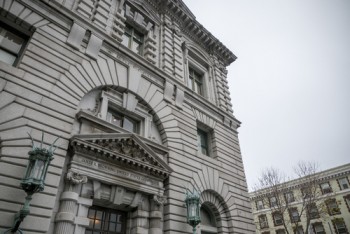9th Circuit denies inmate new trial because he can't show lawyer's racism affected trial performance

The San Francisco-based 9th U.S. Circuit Court of Appeals/vincenzo_mancuso (Shutterstock.com).
A federal appeals court refused to grant a new trial to a California inmate serving a life sentence for murder because he was unable to show racism by his appointed lawyer caused a deficient trial performance.
The San Francisco-based 9th U.S. Circuit Court of Appeals ruled against Ezzard Ellis, but did so reluctantly, the San Francisco Chronicle reports.
The panel said in a June 7 per curiam opinion that it was bound by 9th Circuit precedent involving the same lawyer, Donald Ames, who is deceased. But all three panel members agreed in a concurrence that the decision makes “a mockery” of the right to counsel.
Ellis was convicted of murder, attempted murder and robbery in his fifth trial in 1991 for a fatal shooting outside a McDonald’s two years earlier. The first two trials ended in mistrials because witnesses were unavailable. The third and fourth trials resulted in hung juries.
Ellis had alleged Ames held deeply racist beliefs about blacks in general and Ellis in particular. But Ellis wasn’t aware of the racism until a friend sent him a newspaper article in 2003 that recounted the testimony of Ames’ adult daughters about his frequent use of racial slurs in regard to clients. Despite those declarations, the 9th Circuit held in 2001 that an inmate wasn’t entitled to relief unless he could show Ames had performed poorly because of the racism. The case was Mayfield v. Woodford.
Pursuing his own case, Ellis obtained declarations from two of the daughters. One daughter recalled a conversation in which her father referred to a client by the N-word and said he “got what he deserved.” The other daughter said Ames harbored contempt for people of other races and ethnic groups, and he especially ridiculed black people.
Ellis also obtained declarations from people who worked with Ames. A court clerk said he used racist terms to describe court personnel, his employees and his clients. One legal secretary who briefly worked for Ames said she heard Ames say he didn’t care what happened to a client because he was black. Another legal secretary said he used the N-word to refer to his black employees and a co-counsel.
But the 9th Circuit said it was bound by Mayfield. Ellis would have to show either he was aware of the racism and it caused a complete breakdown in communications, or that racism adversely affected Ames’ performance as counsel. Ellis was not able to make either showing.
In the concurrence, Judge Jacqueline Nguyen said Ames expressed contempt for people “based on the ugliest of racial stereotypes.” Her opinion was joined by Judges Michael Daly Hawkins and A. Wallace Tashima.
“When examining the reasonableness of counsel’s performance, we extend considerable deference to strategic choices,” Nguyen wrote. “This deference is predicated on the assumption that counsel is acting in the client’s best interest. For an attorney as deeply racist as Ames, that assumption is unfounded.”
Hat tip to the Marshall Project.



